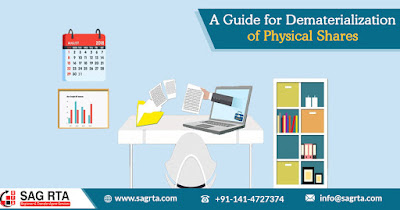SAG Infotech, an established name in the taxation industry has now entered the premises of Registrar and Transfer Agent (RTA) services. The company is now home to Rajasthan’s first-ever RTA services popular with the name of SAG RTA and is fulfilling the needs of investors as well as mutual fund houses. SAG RTA works in line with the clause issued by MCA saying that it is compulsory for Unlisted Public Companies to issue securities only in dematerialized form.
SAG RTA Registrar and Share Transfer Agent puts on view the unlisted equities as well as common debt assets including Certificate of Deposit, Securitized instruments, and lot more.
Authorization from SEBI
SAG RTA, a subordinate of SAG Infotech Pvt Ltd, has authorization from government-regulated share/security controller SEBI or Securities and Exchange Board of India for working as Registrar to an Issue and Share Transfer Agent to an Issuer of Security. Remember, SAG RTA is Rajasthan’s 1st ever SEBI certified RTA services provider.
SAG RTAs Expertise Compass
SAG RTA services are hired also for dematerialization of shares via depository registered with CDSL and NSDL, payout of dividends and interest transfers. Also, the company has an inside track in maintaining investor database as well as security transfer. SAG RTA does renewals of dividends on shareholder’s requests and issues them dividend warrants.
Incharges for Backhand Management and Investor Issues
An expert team is hired for handling backhand business like solving investor’s issues and guiding them with good investment opportunities. The company reaches out to its clients via phone, mail and fax.
SAG RTA is a quick aid to documentation related processes like Change of Name/Name Deletion/Transposition/Transmission, Signature and Address Change. The department facilitates the investor with Duplicate Share Certificate in case the original one is missing, for that the investor must intimate the department regarding the loss.
For issuing the shares/securities in the dematerialized form to the potential investors, the companies need to communicate with SEBI authorized Registrar and Transfer Agent Services which have direct or online access to depositories. SAG RTA will act as a bridge between the Shares/Security Issuers and main depositories (CDSL and NSDL) while maintaining the issuer's transaction with depositories.
Additional Features provided by SAG RTA:
Authorization from SEBI
SAG RTA, a subordinate of SAG Infotech Pvt Ltd, has authorization from government-regulated share/security controller SEBI or Securities and Exchange Board of India for working as Registrar to an Issue and Share Transfer Agent to an Issuer of Security. Remember, SAG RTA is Rajasthan’s 1st ever SEBI certified RTA services provider.
SAG RTA services are hired also for dematerialization of shares via depository registered with CDSL and NSDL, payout of dividends and interest transfers. Also, the company has an inside track in maintaining investor database as well as security transfer. SAG RTA does renewals of dividends on shareholder’s requests and issues them dividend warrants.
Incharges for Backhand Management and Investor Issues
An expert team is hired for handling backhand business like solving investor’s issues and guiding them with good investment opportunities. The company reaches out to its clients via phone, mail and fax.
SAG RTA is a quick aid to documentation related processes like Change of Name/Name Deletion/Transposition/Transmission, Signature and Address Change. The department facilitates the investor with Duplicate Share Certificate in case the original one is missing, for that the investor must intimate the department regarding the loss.
For issuing the shares/securities in the dematerialized form to the potential investors, the companies need to communicate with SEBI authorized Registrar and Transfer Agent Services which have direct or online access to depositories. SAG RTA will act as a bridge between the Shares/Security Issuers and main depositories (CDSL and NSDL) while maintaining the issuer's transaction with depositories.
Additional Features provided by SAG RTA:
- A unique login dashboard facility for professionals like CA, CS and others and Companies associated with SAG RTA.
- Tracking records of various clients at a time in single login.
- Fee Calculator feature for the clients to gain exact figures of fees payable to depositories and RTA.
- Pre-prepared documents for corporate reportings.
- Log of activities by issuer and professionals in login dashboard
- Maintaining the joint with both CDSL & NSDL depositories.
SAG RTA now is a trustworthy name after reviews from its existing clients. Various reputed Issuers rely upon us on the grounds of our services, security and privacy.



